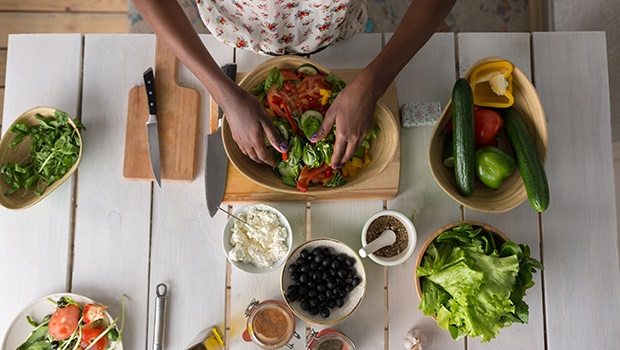
You’re ready to adopt a healthy lifestyle this year, but where to start? The good news is, you don’t need to make drastic changes. Take small steps every day and soon you’ll see the effects rather than start too strong and end up feeling overwhelmed.
“Remember that your ultimate objective is to maintain your health,” says Jacinta Lebakeng, a registered dietician, “so incorporating exercise is also important. Part of your fitness goals can include losing weight, building muscle and toning your body. And when shopping for groceries, buy food that’s on par with your goals.”
Where do I start?
A health practitioner such as a doctor or dietician will conduct a body assessment to determine what your body needs to function well with the changes you’d like to make. Here are some guidelines to keep in mind and set you on your way to a healthier you.
Tuck into your vegetables
While all veggies provide nutrients for your body, some contain those that serve your particular health goals better. Lebakeng advises avoiding dense and starchy vegetables like potatoes, sweetcorn, peas, sweet potatoes, parsnips and pumpkin. Non-starchy vegetables contain fewer calories and should form the bulk of veggies on your plate. These include tomatoes, onions, peppers, cucumbers, broccoli, carrots and salad greens like lettuce and spinach. “Don’t peel the skin off vegetables as they have both soluble fibre (found in the flesh) and insoluble fibre (found in the skin), which helps with weight loss. Also, make sure that all the veggies you consume are fresh,’’ says Lebakeng.
Choose plant-based fats
There are four different types of fats that can appear on a nutrition label: trans, saturated, polyunsaturated and monounsaturated fats. The so-called ‘good fats’ are monounsaturated and polyunsaturated. They lower cholesterol levels and reduce your risk for heart disease, strokes and diabetes. Good fats are found in fruits like avocados; in olive oil, canola and sunflower oil; in walnuts, cashews and almonds, which are rich in Omega 3, and in sardines.
So-called ‘bad fats’ are trans and saturated fats. According to registered dietician Lila Bruk, they can raise your ‘bad’ cholesterol levels even higher, lower your ‘good’ cholesterol and increase your risk factors for coronary heart disease and strokes. “Bad fats are found in animal products such as meat and dairy products,” adds Lebakeng. “So, when buying dairy products, opt for low-fat instead of full cream products. Plant-based saturated fats are found in coconut and palm kernels.” Another way to reduce your intake of animal fat is to cut off all visible fat around the meat before cooking it.
Eat three fruits a day
Fruits contain vitamins and the chemicals that minimise cell damage, known as antioxidants. These can reduce your risk of getting illnesses like cancer. They also contain fibre to keep your digestive system healthy because fruits are low in calories and high in fibre. “Fruits contain natural sugars, which are healthy for you – unlike the added sugar in most products,’’ says Lebakeng. Bruk recommends eating at least three fruits, such as nectarines, peaches and plums, daily.
Control your carb intake
Carbohydrates are present in healthy and unhealthy food. They supply us with energy in the form of calcium, minerals and vitamin B. Examples of ‘good’ carbs include whole grains such as wholewheat bread and brown rice, while ‘bad’ carbs include white bread, chips and processed foods. The best sources of fibre come from whole grains, which help keep your digestive system healthy.
Lebakeng says we need carbohydrates for glucose because our brains can’t function without it. “Don’t cut carbohydrates out of your diet. It’s about portion control – half of your plate should consist of vegetables, a quarter must be protein and the other quarter should be carbohydrates. Eat whole grains, beans, nuts, seeds, oatmeal and fruits, and avoid refined whole grains such as sugar and pastries.” Bruk adds that carbohydrates are not an issue when it comes to losing weight as it all comes down to your calorie intake, so eat mindfully.
Include more lean meat
Protein is an important component of every cell in the body. It builds and repairs tissues and make enzymes, hormones and other body chemicals. Protein is also a building block of bone, muscle, cartilage, skin and blood. Lebakeng recommends that you check food labels and look for the word “lean” on the package. Eat ground turkey breast, which is low in saturated fat. Fish is also a lean alternative. Salmon, in particular, is high in Omega 3 fatty acids, which can lower your risk for contracting heart disease.
Drink more water
Avoid fizzy and most carbonated drinks. Rather drink diluted juice or, even better, water, which is much healthier. “If you feel water is too boring or tasteless, simply add lime, lemon, berries or cucumbers for an interesting taste,” Lebakeng advises.
Snack regularly
It’s okay to snack when done the correct way, but too much snacking will turn you into a food addict. A small, nutritious snack will prevent you over-eating at mealtimes.
Reduce cheat days
It’s okay to treat or reward yourself with a little snack after a productive week. If it’s a large portion, share it with a friend so you don’t end up eating too much and ruining all your good work during the week.
Cut down on alcohol
While an occasional drink is fine, heavy or binge drinking can damage your liver leading to a life-threatening condition called cirrhosis, a chronic disease of the liver marked by cell decay, inflammation and fibrous thickening of the tissues. Also, some alcohol can contain a lot of empty calories, which can hinder weight loss.










